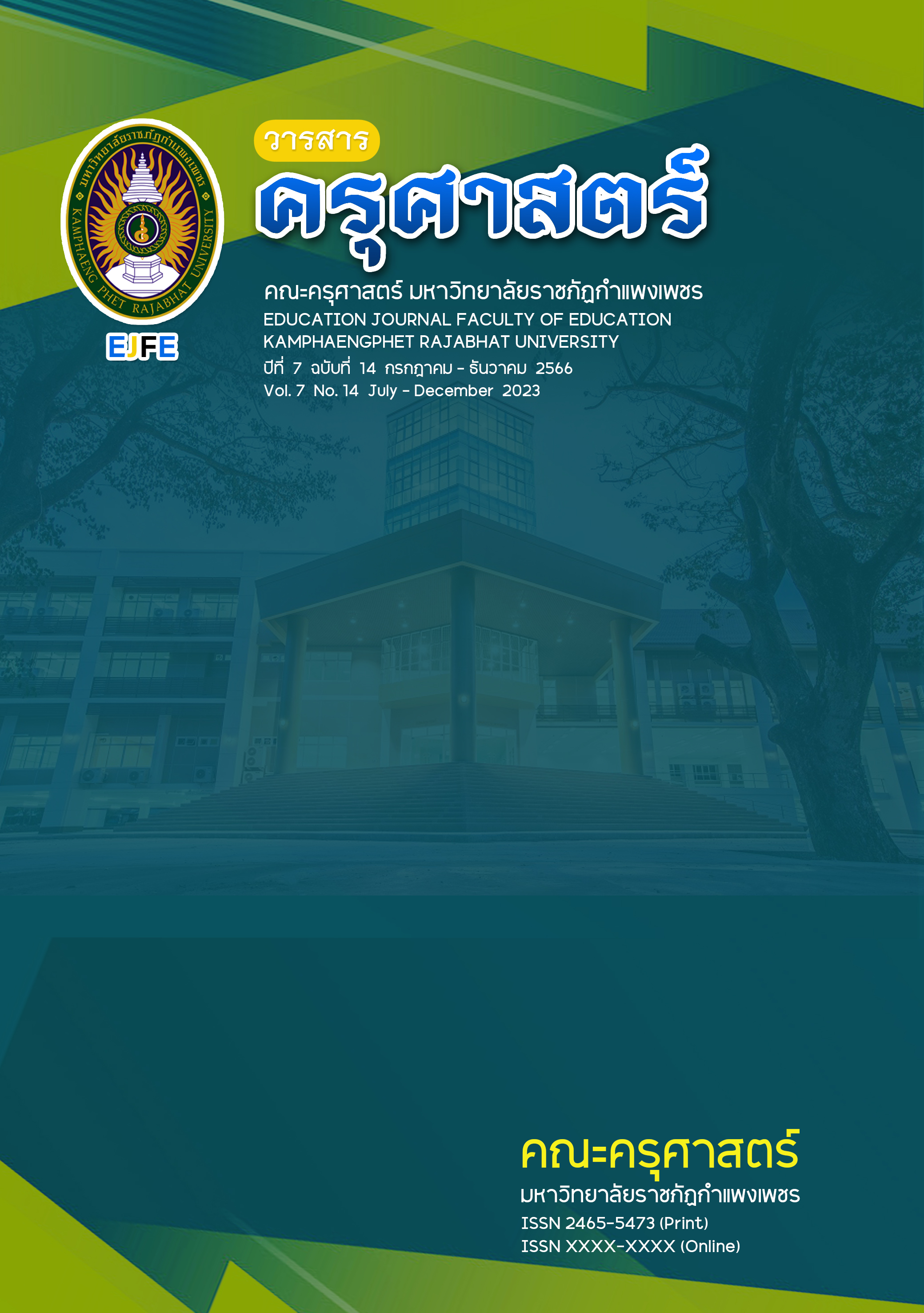Applying the Four Faiths in Buddhism for Developing Teacher’ Spirit
Main Article Content
Abstract
This academic article aims to analyze the spiritual characteristics of a teacher, especially love and faith in the teaching profession, which is considered an important goal in teacher development. If a teacher has love and believes in the teaching profession, he will become a person who is dedicated, sacrificed, and determined to develop himself including professionals and learners in both academic and life skills, know how to use the way of life to be a role model for others, behave according to society, honor, and respect. To reach the spirit of being a teacher is important to rely on faith. Therefore the author presents the application of the four principles of faith in Buddhism to be used to cultivate student, trainee and stationed teachers as a guideline for self-improvement consisting of: 1) believing in every deliberate action (Kammasaddha) will have consequences, teachers must concentrate on performing their duties with full capacity because every action will not be in vain 2) believing in the consequences of actions (Vipakasaddha), every result is caused by a cause, no coincidence, teachers must be confident that if done with determination, it will lead to the desired results 3) believing in the individual ownership of action (Kammassakatasaddha), the results give back to what we have done, no one can take the Karma instead, the teacher must believe in their own actions by focusing on positive self-development in behavioral, thinking and attitude skills, and 4) believing that if you intend to do it, one day the goal must be achieved (Tatha Bodhisaddha). Attaining a teacherhood endowed with love, mercy, and justice, which is a noble spirit.
Article Details

This work is licensed under a Creative Commons Attribution-NonCommercial-NoDerivatives 4.0 International License.
CC Attribution-NonCommercial-NoDerivatives 4.0
References
กาญจนา คุณารักษ์ (2561). สู่ความเป็นครูมืออาชีพ. วารสารวิชาการ มหาวิทยาลัยกรุงเทพธนบุรี, 7(2), 1-7.
กัญภร เอี่ยมพญา นิวัตต์ น้อยมณี อภิชาต อนุกูลเวช และ ดาวประกาย ระโส. (2564). จิตวิญญาณครูในศตวรรษที่ 21. วารสารครุศาสตร์ปริทรรศน์, 8(2), 398-409.
กิตติชัย สุธาสิโนบล. (2564). ครูมืออาชีพ จิตวิญญาณแห่งศาสตร์และศิลป์ของความเป็นครู. กรุงเทพฯ:คอมเมอร์.
ชุติมา ธรรมรักษา. (2566, กรกฎาคม 2). ครูพันธุ์ใหม่ในยุคปฏิรูปการศึกษา. [Online]. Available : https://www.bu.ac.th/knowledgecenter/executive_journal/oct_dec_06/oct_dec _06/Executive%20Journal_112-115.pdf. [2566, กรกฎาคม 2].
นิวัตต์ น้อยมณี และ กัญภร เอี่ยมพญา. (2560). จิตวิญญาณครู. นนทบุรี:21 เซ็นจูรี่.ปริยาภรณ์ ตั้งคุณานันต์. (2561). ความเป็นครูมืออาชีพ. กรุงเทพฯ:มีน เซอร์วิส ซัพพลาย.
พระครูวินัยวรชัด ปยุตโต. (2560). การสร้างศรัทธาในพระพุทธศาสนา. วารสารคณะรัฐศาสตร์และรัฐ ประศาศนศาสตร์ มหาวิทยาลัยราชภัฏมหาสารคาม, 2(1), 83-100.
พระครูสังฆรักษ์จักรกฤษณ์ ภูริปัญโญ พระครูโสภณพุทธิศาสตร์ พระครูโอภาสนนทกิตติ์ สมศักดิ์ บุญปู่ และ พีรวัฒน์ ชัยสุข. (2562). จิตวิญญาณความเป็นครูมืออาชีพ. วารสารมหาจุฬานาครทรรศน์, 6(1), 31-37.
พระพรหมคุณาภรณ์ (ป.อ.ปยุตโต). (2559). พจนานุกรมพุทธศาสตร์ ฉบับประมวลธรรม. (พิมพ์ครั้งที่ 34). กรุงเทพฯ:มูลนิธิการศึกษาเพื่อสันติภาพ.
พระมหาตุ๋ย ขันติธัมโม(คำหน่อ) และ พระสมุห์พุฒิพงษ์ พุทธิวังโส(กล่ำทวี). (2564). บทบาทครูในศตวรรษที่ 21 ครูผู้สร้างคน. วารสารภาวนาสารปริทัศน์, 1(3), 13-26.
พระอธิการสมพร อนาลโย พระสุวิจักษ์ โชติวโร และ อิสรพงษ์ ไกรสินธุ์. (2562). วิเคราะห์ศรัทธาในระบบความเชื่อจากคำสอนของพระพุทธศาสนา. วารสารนัมฎองแหรกพุทธศาสตรปริทรรศน์, 6(1), 91-103.
ภาวิดา มหาวงศ์ พาสนา จุลรัตน์ อนุ เจริญวงศ์ระยับ และ ช่อลัดดา ขวัญเมือง. (2562). การพัฒนาแบบวัดจิตวิญญาณความเป็นครูของนักศึกษาวิชาชีพครูมหาวิทยาลัยราชภัฏ. วารสารหาดใหญ่วิชาการ, 17(2), 201-220.
มนตรี หลินภู. (2566). จิตวิทยาเพื่อการเรียนรู้. กำแพงเพชร:ครุศาสตร์ มหาวิทยาลัยราชภัฏกำแพงเพชร.
มลิวัลย์ สมศักดิ์ นิตยารัตน์ คงนาลึก ทิพวรรณ ทองขุนดำ และ รพีพรรณ อักษราวดีวัฒน์. (2561). องค์ประกอบและตัวชี้วัดจิตวิญญาณความเป็นครูของนักศึกษาคณะครุศาสตร์ มหาวิทยาลัยราชภัฏ. วารสารเทคโนโลยีภาคใต้, 11(1), 51-58.
รักษิต สุทธิพงษ์. (2563). จิตวิญญาณและอุดมการณ์ความเป็นครู. กรุงเทพฯ:ดีเซมเบอรี่.
ราชกิจจานุเบกษา. (2556). ข้อบังคับคุรุสภาว่าด้วยจรรยาบรรณของวิชาชีพ พ.ศ. 2556. เล่ม 130,ตอนพิเศษ 130 ง, 72-74.
ราชวิทยาลัยสูตินรีแพทย์แห่งประเทศไทย. (2560). สูตินรีแพทย์สัมพันธ์ มาตรฐานและจริยธรรมเพื่อสุขภาวะของสตรี. ปีที่ 26 ฉบับที่ 2 กุมภาพันธ์ 2560.
รุ้งลาวัณย์ จันทรัตนา. (2566). คุณลักษณะสำคัญและรูปแบบการพัฒนาคุณลักษณะครูนักพัฒนา. วารสารมหาวิทยาลัยราชภัฏยะลา, 18(2), 131-141.
วัลนิกา ฉลากบาง. (2559). จิตวิญญาณความเป็นครู: คุณลักษณะสำคัญของครูมืออาชีพ. วารสารมหาวิทยาลัยนครพนม, 6(2), 123-128.
หิน เหล็ก ไฟ. (2566, กรกฎาคม 2). ศรัทธา. [Online]. Available : https://dekgenius.com/lyrics/thaisong/thailyricsonline-id-2677.htm.[2566, กรกฎาคม 2]
อนุสรณ์ จันทร์ประทักษ์ และ จันทร์เพ็ญ ภูโสภา. (2563). การเสริมสร้างคุณลักษณะความเป็นครูด้านความรักและศรัทธาในวิชาชีพครูสำหรับนักศึกษาครุศาสตร์ มหาวิทยาลัยราชภัฏมหาสารคาม. วารสารครุศาสตร์ มหาวิทยาลัยราชภัฏมหาสารคาม, 17(1), 543-555.
Madelo, Nelia Quisay. (2015). The Influence of spirituality of Teachers and Moral Values of Students on the 21st century skills development of students. International Journal of Novel Research in Education and Learning, 2(4), 22-61.


